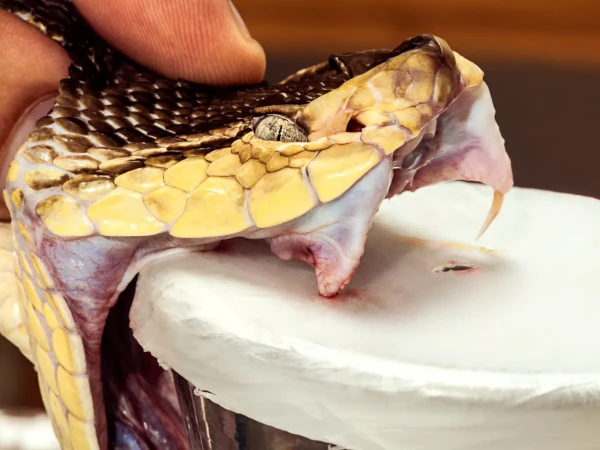Venomous snakebites are a medical emergency, and antivenom is the most effective hospital treatment for serious envenomation. This article explains what antivenom is, how it works, why timing matters, and what to do immediately after a bite. For step-by-step first aid, see snakebite first aid.

How Venom Affects the Body
Snake venom is a complex mixture of toxins that can damage nerves, blood, muscle, and organs. The exact effects depend on the species, the amount of venom injected, and the bite location. Symptoms can range from local pain and swelling to paralysis, bleeding problems, or collapse. Because symptoms can change quickly, immediate medical care is critical.
What Antivenom Is
Antivenom is a biological medicine made by exposing animals (often horses or sheep) to small, controlled doses of venom. The animal’s immune system produces antibodies, which are then purified to create antivenom. These antibodies bind to venom components in the bloodstream and neutralize them. This method has been refined for over a century and remains the gold standard for treating severe snakebite.
Antivenom Is Not a General Cure-All
Antivenom does not reverse tissue damage already done. It works by stopping venom from continuing to act in the body, which is why timing matters so much.
Why Speed Matters
Antivenom works best when given as early as possible after a bite. It can reduce the spread of venom, slow damage to organs, and improve recovery outcomes. That is why correct first aid and rapid transport to hospital matter. Do not drive yourself if you are alone and injured. Call 000 in Australia.
How Doctors Decide to Use Antivenom
Hospital teams assess symptoms, vital signs, and blood tests to determine whether antivenom is needed. Not every snakebite requires antivenom, but serious envenomation does. Because antivenom is species-specific or region-specific, identifying the likely snake helps guide treatment. Learn more in treating snake bites in Australia.
What Hospitals Look For
Doctors consider:
- Worsening swelling or pain
- Changes in blood clotting
- Neurological signs like drooping eyelids or slurred speech
- Evidence of organ stress
These indicators help determine whether antivenom is appropriate.
Risks and Side Effects
Antivenom saves lives but can cause allergic reactions, including anaphylaxis. For this reason, it is administered in a controlled medical setting with monitoring and emergency support. The benefits of antivenom usually outweigh the risks when envenomation is severe.
What To Do If a Snake Bites You
Follow these steps while waiting for medical care:
- Call 000 immediately.
- Apply a pressure immobilization bandage.
- Keep the bitten limb still and below heart level.
- Do not wash the bite site, cut the wound, or attempt to suck venom.
For detailed guidance, read snakebite first aid and treating snake bites in Australia.
The Role of Antivenom in Australia
Australia has some of the world’s most venomous snakes, which is why antivenom protocols are well established. Most Australian antivenoms are produced by specialized laboratories and hospitals have clear treatment guidelines. This system saves lives every year, but rapid response and correct first aid remain essential.
Brisbane Safety Reminder
If a snake is on your property, do not attempt to handle it. Call a licensed professional. Our snake catcher services cover Brisbane North, and we offer emergency snake removal. If you want a quick price guide, see snake removal cost.
Key Takeaways
Antivenom is a lifesaving treatment made from antibodies that neutralize snake venom. It works best when administered quickly in a hospital setting. If a bite occurs, call 000, apply pressure immobilization, and seek urgent medical care.